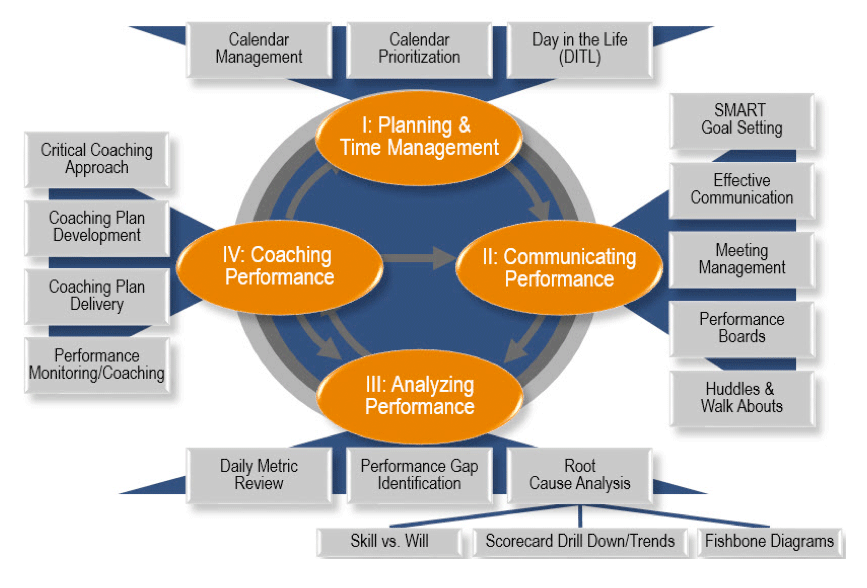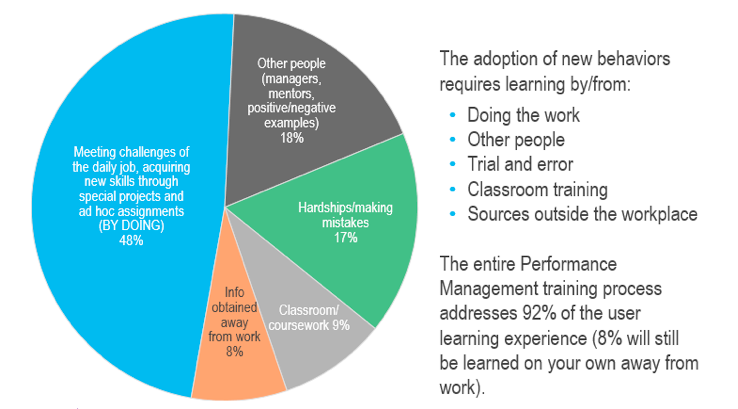McIntosh’s Performance Management training case-study-book framework consists of four key modules and is delivered to front-line supervisors and their managers.
The four modules include:
- Planning and Time Management
- Performance Communications
- Performance Analysis
- Performance Coaching and Improvement
It is a robust curriculum customized to specific client operational needs with all classroom exercises and examples taken from the actual systems and scorecard reports used by the client organization. If the client does not have specific performance metrics from the agent through site levels, McIntosh will work with the client organization to design and implement a balanced scorecard prior to the start of training.
Training generally occurs over a 10-12 week period and follows a specific pattern of blending limited classroom sessions with extensive mentoring, a form of on-the-job training:
- Weeks 1-5, four hours of classroom training is conducted early in the week. Two hours are devoted to communicating core performance management concepts and specific skills. The remaining two hours are dedicated to practicing those skills.
- Each week the participants are expected to incorporate new skills taught during the weeks training into their daily behavioral repertoire and to continue to refine and master skills taught in earlier weeks.
- A mentor is assigned to each participant and spends between 1.5 and 2 hours per day with each participant observing them as they incorporate the new skills into their daily routine. The mentor provides guidance, critiques skill usage, and may schedule the participant for a working session if the core concept/skill is elusive for the participant.
- Mentoring continues throughout the training period with a weekly adoption report detailing individual participant adoption rates and proficiency with the skills being taught.
- During the course of training/mentoring, McIntosh will work with the client organization to develop performance management tools for use by all participants (e.g., trend charts, Ischikawa or fish-bone diagnostic diagrams, performance improvement plan templates, performance review/meeting templates, etc.)
- McIntosh will initially facilitate and then audit daily performance meetings between managers and supervisors to ensure daily focus on performance goals. Once the organization has learned how to effectively communicate performance, these daily recaps or reviews will be thirty minutes or less and will ensure constant communication eliminating the need for other less productive and less frequent meetings.
The schematic below identifies the core curriculum elements included in each module.

McIntosh is unique in that we approach performance management training holistically, providing guidance in the application and refinement of skills. Research tells us that people learn most effectively by doing, that only a small part of what we learn is actually learned in a classroom setting. McIntosh takes that insight and applies it to management training, ensuring we leverage multiple approaches to make our training more reality based. Note that our training approach includes the learning by doing, by making mistakes, by mentoring, and through classroom instruction. The following chart illustrates the different ways people learn.
How do people learn?

In keeping with the holistic approach, the schematic below illustrates how performance data is analyzed to provide the supervisor with direction relative to agent performance gaps. The process begins with understanding, a review of the various reports and performance data that when viewed together provide direction on the severity and nature of the performance gap. Once the supervisor monitors and determines if the gap is skill or will based, they then move to coaching (will) or further root cause analysis (skill) leveraging various tools and a performance improvement action plan to achieve the desired results.
McIntosh has delivered this training to over 20 call center organizations with our clients reporting the following benefits post-training:
- The basic management skills and focus of front-line supervisors are dramatically improved, creating a pool of management candidates for potential promotion to other parts of the organization
- Individuals participating in the process report that while stressful during implementation, the process change actually simplifies and clarifies their workload and gives them a sense of control over their team’s results. Supervisors report higher engagement levels post training.
- Not only does overall performance relative published metrics improve, performance volatility at the individual through site levels is diminished, enhancing business results and delivering a more consistent customer experience.
- Agents report that their supervisors are more knowledgeable, more engaged in the business. They also report that the process of understanding and supporting agent performance builds trust in the organization. Agents prefer the new collaborative process of coaching to a skill rather than the old approach of judging performance and coaching to a metric.
For more information on our performance management training and mentoring programs, contact us at 214-288-2321 or contact us. Our framework is proven, our use of it consistent. We customize content and materials to each client’s environment.





